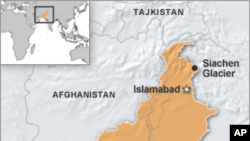A team of U.S. experts is in Pakistan to assist in recovery operations, two days after an avalanche buried more than 135 Pakistani soldiers and civilians in what is known as the world's highest battlefield. India and Pakistan have been engaging in a nearly three-decade fight over the Siachen Glacier, and the avalanche has revived calls for the region's demilitarization.
Nearly 300 workers, most of them Pakistani soldiers, have been using bulldozers and other heavy equipment to recover the victims of Saturday's massive avalanche, which hit a military base at an altitude of 15,000 feet on the Siachen Glacier.
But three days after the disaster, officials have not recovered anyone dead or alive. U.S. embassy spokesman Mark Stroh told VOA that in response to a Pakistani request, an eight-member team of American experts has arrived in Islamabad to assist in the rescue operation.
“This is a team that is trained to operate in search and rescue operations at very, very high altitudes. They are trained in recovery, mass casualty medical support and things of this nature," said Stroh. "Their intention is to do whatever is required from the Pakistani side. They have not yet been able to travel to Siachen because the weather has not permitted that travel.”
Pakistan and India both claim the Siachen Glacier and have deployed thousands of troops to the region at an altitude of around 20,000 feet - making it the world’s highest battleground.
The conflict began in 1984, when Indian troops seized the heights of the 78-kilometer-long glacier, prompting Pakistan to establish military bases on the other side.
The Siachen region is located on the northern tip of the de facto Line of Control dividing the Himalayan region of Kashmir.
Both Islamabad and New Delhi have honored a cease-fire along the disputed border since 2003, which has largely ended skirmishes on the glacier. In fact, experts say extreme weather has killed more Indian and Pakistan soldiers than fighting.
Critics have long urged India and Pakistan to pull their forces out of the Siachen region, calling it a “pointless conflict.” Saturday's deadly avalanche has revived those demands.
“Pakistan and Indian need to work towards cooperative engagement in that area, we need to demilitarize Siachen the soonest. [For] decades, not a gun has fired in Siachen. Really, it’s a waste of effort, waste of resources and unfortunately source of loss of life,” said Shehzad Chaudhry, a former Pakistani air force commander.
Arshad Abbasi is an independent researcher and environmental activist based in Pakistan. He said that military activity has led to the melting of the Siachen glacier, as well as surrounding glaciers.
"[The] melting of [a] glacier is in fact an indicator of climate change and in this region this glacier is melting because of the presence of the army. We urge [the] global community please, this is a time they have to act and they have to force both countries. This is a global heritage, this is a global asset. This should be protected to save countries from the consequences of... climate change,” said Abbasi.
As Abbasi put it, “Siachen is weeping, tomorrow the world will cry.”
During talks in New Delhi a day after the avalanche, President Asif Ali Zardari discussed the issue with Indian Prime Minister Manmohan Singh.
“I spoke about the glaciers and the water dispute between India and Pakistan. We cannot wish India away, nor can they wish us away. But we have to learn to live with each other. And that is exactly the message I carried to the Indian government," said Zardari.
The demands for an end to the Siachen conflict also echoed Monday in Pakistan's parliament, where lawmakers urged President Zardari’s government to aggressively pursue a diplomatic resolution with India in an effort to prevent further financial and human losses.




